Normann Copenhagen's Bau is a sculptural pendant lamp designed by Vibeke Fonnesberg Schmidt. The pendant light consists of thin basswood discs that interlock to create a fascinating wooden structure. Bau is both a lamp and a decorative object – its look varies depending on the viewing angle. The smaller Bau lamp has 59 parts and it comes flat-packed with an instruction manual.
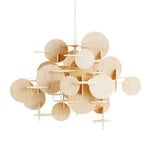
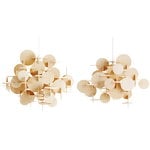
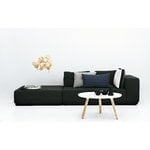
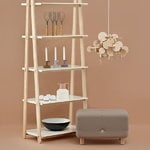
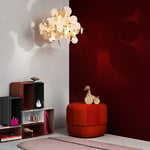
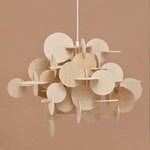
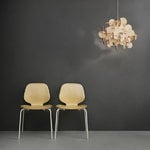
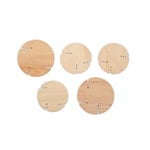
Bau pendant, small, natural
Normann Copenhagen
Description
Normann Copenhagen's Bau is a sculptural pendant lamp designed by Vibeke Fonnesberg Schmidt. The pendant light consists of thin basswood discs that interlock to create a fascinating wooden structure. Bau is both a lamp and a decorative object – its look varies depending on the viewing angle. The smaller Bau lamp has 59 parts and it comes flat-packed with an instruction manual.
Product details (17)
- Material
- Linden wood veneer
- Colour
- Natural
- Width
- 57.5 cm
- Height
- 44 cm
- Bulb base
- EU: E27 / US:E26
- Light source
- 8W LED (not included)
- IP rating
- 20
- Protection class
- EU: II / US: I
- Voltage
- 220–240 V
- Nominal frequency
- 50–60 Hz
- Certifications and labels
- EU: CE marked: tested and approved according to European standards
- Cable length
- 400 cm
- Cable material
- Textile
- Weight
- 1.2 kg
- Notes
- Requires self-assembly. Assembly manual included.
- Ceiling plug
- No
- Dimmable
- No, but can be fitted with an aligned dimmer.
- Product ID
Designer
The Danish designer Vibeke Fonnesberg Schmidt (b.1967) graduated from the Danish School of Design in 1994. In the beginning of her career she was mainly working with unique ceramic pieces, but has, later on, turned to wood and lasercut plexi-glass. Fonnesberg Schmidt’s work is characterized by simple, geometrical forms.
View all productsReviews (1)
5
Based on 1 reviews
-
B
Beatriz S
Lisbon, Portugal
All good my experience has been always great with finish design
319 days ago
Sustainability
The Product Sustainability Framework, our criteria of sustainable design, helps you find the most sustainable products in our selection. Read below which sustainability criteria this product has met.
Working conditions & labour 7/9
-
Equal opportunities for all employees
-
Commitment to UN Global Compact, fair compensation for all employees
-
Corporate responsibility requirements defined and communicated for suppliers
-
Systematic work for improved inclusion and well-being in the workplace
-
Transparent supply chain
-
Suppliers' compliance to a code of conduct ensured
-
Compliance to the UN Guiding Principles on Business and Human Rights ensured in the supply chain
-
Direct suppliers audited and certified
-
Support for community involvement in the supply chain
Eco-friendly production 6/9
-
Fair and resource-wise water-use in production
-
No incineration or landfilling of returned items
-
No use of endangered species as materials
-
No direct environmental emissions or waste (excl. GHGs) from production
-
Material-efficient and ecological packaging
-
No potentially harmful chemicals used in own production
-
The sustainability of direct suppliers' production is addressed and monitored
-
Production and material sourcing that respect biodiversity, animal rights, and natural ecosystems
-
Positive impact on nature’s well-being through operations that regenerate natural ecosystems
Climate impact 4/8
-
Company's direct greenhouse gas emissions identified and commitment to reduction
-
Product's carbon impact identified and commitment to reduction
-
Guidance on energy- and eco-efficient use of the product
-
Contribution to climate initiatives beyond the brand’s direct operations
-
Low-carbon or compensated transportation
-
Carbon footprint of the product calculated and goals set to reduce it
-
100 % renewable energy in own production and operations
-
Carbon neutral or carbon negative product
Sustainable materials 3/6
-
Sustainable and long-lasting material choices
-
No harmful or hazardous substances
-
Responsible raw material sourcing and production
-
Materials suited for circularity: monomaterials, recyclable finishings, renewable or recycled contents etc.
-
Ecological materials: natural, biodegradable, recyclable or recycled contents
-
Outstanding materials in terms of innovativeness, responsibility, sustainability and circularity: local production or sourcing, 100 % recycled content, C2C-certification etc.
Circular design 2/5
-
High aesthetic quality promoting long-term use of the product
-
Design for enduring life-long quality
-
Technically durable product design and material choices
-
Design and support for product maintenance, repair and upgradability
-
Innovative circular design solutions: circular service system, resale platform, remanufacturing, collection of used products, etc.











